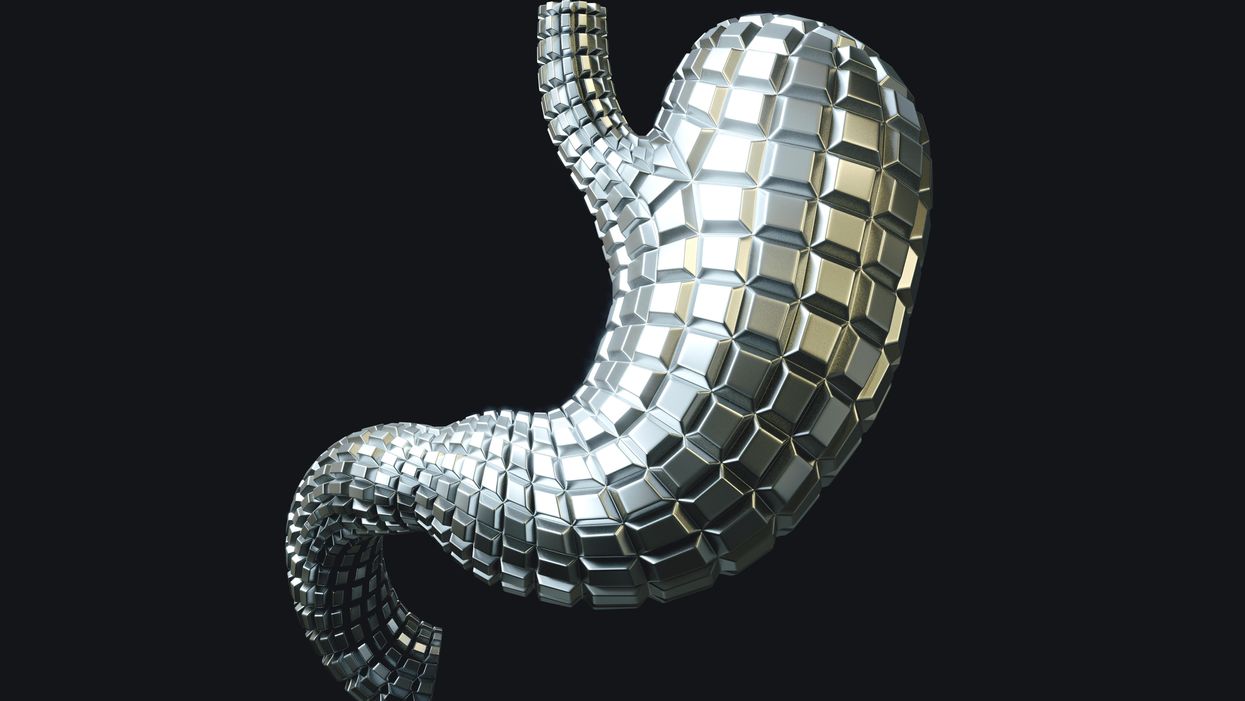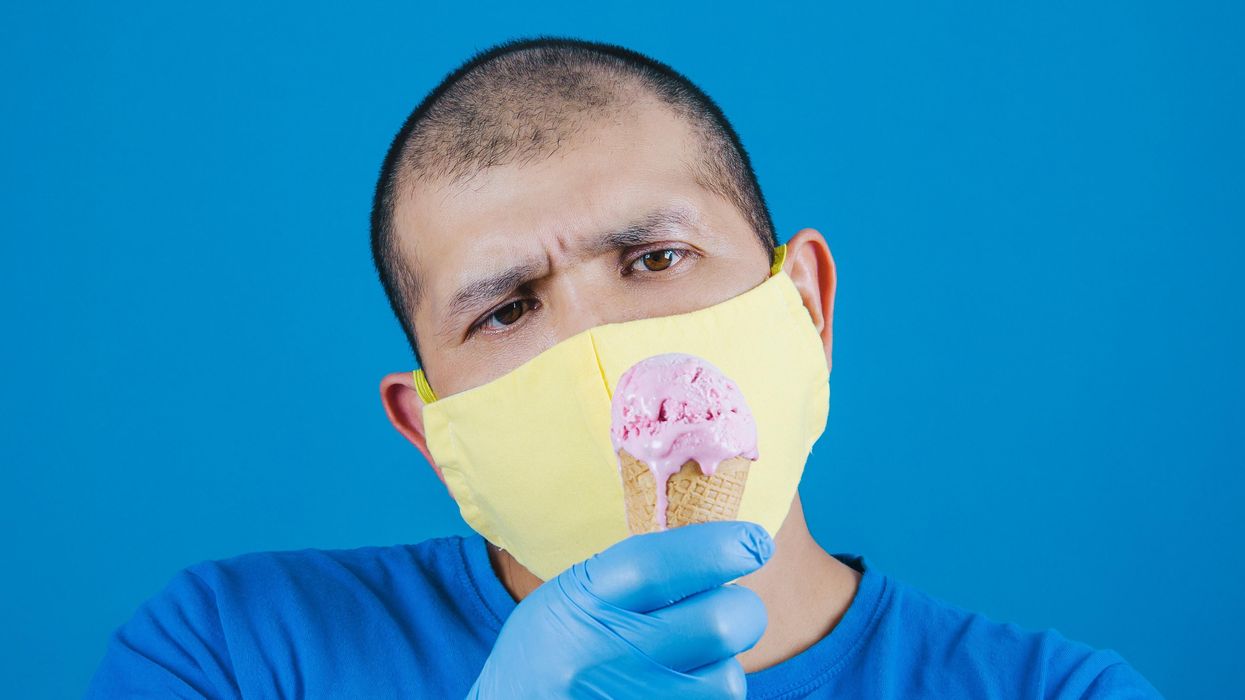Video: An overview of the monkeypox virus

Kalpana Pot walks us through the latest information on the monkeypox outbreak.
Click below for an overview of everything you need to know about the latest status of monkeypox - in 58 seconds.
An Overview of Monkeypox with Kalpana Pot
 An Overview of the Monkeypox Virus
youtube.com
An Overview of the Monkeypox Virus
youtube.com
A Stomach Implant Saved Me. When Your Organs Fail, You Could Become a Cyborg, Too
Ordinary people are living better with chronic conditions thanks to a recent explosion of developments in medical implants.
Beware, cyborgs walk among us. They’re mostly indistinguishable from regular humans and are infiltrating every nook and cranny of society. For full disclosure, I’m one myself. No, we’re not deadly intergalactic conquerors like the Borg race of Star Trek fame, just ordinary people living better with chronic conditions thanks to medical implants.
In recent years there has been an explosion of developments in implantable devices that merge multiple technologies into gadgets that work in concert with human physiology for the treatment of serious diseases. Pacemakers for the heart are the best-known implants, as well as other cardiac devices like LVADs (left-ventricular assist devices) and implanted defibrillators. Next-generation devices address an array of organ failures, and many are intended as permanent. The driving need behind this technology: a critical, persistent shortage of implantable biological organs.
The demand for transplantable organs dwarfs their availability. There are currently over 100,000 people on the transplant waiting list in the U.S., compared to 40,000 transplants completed in 2021. But even this doesn’t reflect the number of people in dire straits who don’t qualify for a transplant because of things like frailty, smoking status and their low odds of surviving the surgery.
My journey to becoming a cyborg came about because of a lifelong medical condition characterized by pathologically low motility of the digestive system, called gastroparesis. Ever since I was in my teens, I’ve had chronic problems with severe nausea. Flareups can be totally incapacitating and last anywhere from hours to months, interspersed with periods of relief. The cycle is totally unpredictable, and for decades my condition went both un- and misdiagnosed by doctors who were not even aware that the condition existed. Over the years I was labeled with whatever fashionable but totally inappropriate medical label existed at the time, and not infrequently, hypochondria.
Living with the gastric pacer is easy. In fact, most of the time, I don’t even know it’s there.
One of the biggest turning points in my life came when a surgeon at the George Washington University Hospital, Dr. Frederick Brody, ordered a gastric emptying test that revealed gastroparesis. This was in 2009, and an implantable device, called a gastric pacer, had been approved by the FDA for compassionate use, meaning that no other treatments were available. The small device is like a pacemaker that’s implanted beneath the skin of the abdomen and is attached to the stomach through electrodes that carry electrical pulses that stimulate the stomach, making it contract as it’s supposed to.
Dr. Brody implanted the electrical wires and the device, and, once my stomach started to respond to the pulses, I got the most significant nausea relief I’d had in decades of futile treatments. It sounds cliché to say that my debt to Dr. Brody is immeasurable, but the pacer has given me more years of relative normalcy than I previously could have dreamed of.
I should emphasize that the pacer is not a cure. I still take a lot of medicine and have to maintain a soft, primarily vegetarian diet, and the condition has progressed with age. I have ups and downs, and can still have periods of severe illness, but there’s no doubt I would be far worse off without the electrical stimulation provided by the pacer.
Living with the gastric pacer is easy. In fact, most of the time, I don’t even know it’s there. It entails periodic visits with a surgeon who can adjust the strength of the electrical pulses using a wireless device, so when symptoms are worse, he or she can amp up the juice. If the pulses are too strong, they can cause annoying contractions in the abdominal muscles, but this is easily fixed with a simple wireless adjustment. The battery runs down after a few years, and when this happens the whole device has to be replaced in what is considered minor surgery.
Such devices could fill gaps in treating other organ failures. By far most of the people on transplant waiting lists are waiting for kidneys. Despite the fact that live donations are possible, there’s still a dire shortage of organs. A bright spot on the horizon is The Kidney Project, a program spearheaded by bioengineer Shuvo Roy at the University of California, San Francisco, which is developing a fully implantable artificial kidney. The device combines living cells with artificial materials and relies not on a battery, but on the patient’s own blood pressure to keep it functioning.
Several years into this project, a prototype of the kidney, about the size of a smart phone, has been successfully tested in pigs. The device seems to provide many of the functions of a biological kidney (unlike dialysis, which replaces only one main function) and reliably produces urine. One of its most critical components is a special artificial membrane, called a hemofilter, that filters out toxins and waste products from the blood without leaking important molecules like albumin. Since it allows for total mobility, the artificial kidney will provide patients with a higher quality of life than those on dialysis, and is in some important ways, even better than a biological transplant.
The beauty of the device is that, even though it contains kidney cells sourced, as of now, from cadavers or pigs, the cells are treated so that they can’t be rejected and the device doesn’t require the highly problematic immunosuppressant drugs a biological organ requires. “Anti-rejection drugs,” says Roy, “make you susceptible to all kinds of infections and damage the transplanted organ, causing steady deterioration. Eventually they kill the kidney. A biological transplant has about a 10-year limit,” after which the kidney fails and the body rejects it.
Eventually, says Roy, the cells used in the artificial kidney will be sourced from the patient himself, the ultimate genetic match. The patient’s adult stem cells can be used to produce some or all of the 25 to 30 specialized cells of a biological kidney that provide all the functions of a natural organ. People formerly on dialysis could drastically improve their functionality and quality of life without being tethered to a machine for hours at a time, three days a week.
As exciting as this project is, it suffers from a common theme in early biomedical research—keeping a steady stream of funding that will move the project from the lab, into human clinical trials and eventually to the bedside. “It’s the issue,” says Roy. “Potential investors want to see more data indicating that it works, but you need funding to create data. It’s a Catch-22 that puts you in a kind of no-man’s land of funding.” The constant pursuit of funding introduces a variable that makes it hard to predict when the kidney will make it to market, despite the enormous need for such a technology.
Another critical variable is if and when insurance companies will decide to cover transplants with the artificial kidney, so that it becomes affordable for the average person. But Roy thinks that this hurdle, too, will be crossed. Insurance companies stand to save a great deal of money compared to what they ordinarily spend on transplant patients. The cost of yearly maintenance will be a fraction of that associated with the tens of thousands of dollars for immunosuppressant drugs and the attendant complications associated with a biological transplant.
One estimate that the multidisciplinary team of researchers involved with The Kidney Project are still trying to establish is how long the artificial kidney will last once transplanted into the body. Animal trials so far have been looking at how the kidney works for 30 days, and will soon extend that study to 90 days. Additional studies will extend much farther into the future, but first the kidneys have to be implanted into people who can be followed over many years to answer this question. But unlike the gastric pacer and other implants, there won’t be a need for periodic surgeries to replace a depleted battery, and the stark improvements in quality of life compared to dialysis add a special dimension to the value of whatever time the kidney lasts.
Another life-saving implant could address a major scourge of the modern world—heart disease. Despite significant advances in recent decades, including the cardiac implants mentioned above, cardiovascular disease still causes one in three deaths across the world. One of the most promising developments in recent years is the Total Artificial Heart, a pneumatically driven device that can be used in patients with biventricular heart failure, affecting both sides of the heart, when a biological organ is not available.
The TAH is implanted in the chest cavity and has two tubes that snake down the body, come out through the abdomen and attach to a 13.5-pound external driver that the patient carries around in a backpack. It was first developed as a bridge to transplant, a temporary alternative while the patient waited for a biological heart to replace it. However, SynCardia Systems, LLC, the Tucson-based company that makes it, is now investigating whether the heart can be used on a long-term basis.
There’s good reason to think that this will be the case. I spoke with Daniel Teo, one of the board members of SynCardia, who said that so far, one patient lived with the TAH for six years and nine months, before he died of other causes. Another patient, still alive, has lived with the device for over five years and another one has lived with it for over four years. About 2,000 of these transplants have been done in patients waiting for biological hearts so far, and most have lived mobile, even active lives. One TAH recipient hiked for 600 miles, and another ran the 4.2-mile Pat Tillman Run, both while on the artificial heart. This is a far cry from their activities before surgery, while living with advanced heart failure.

Randy Shepard, a recipient of the Total Artificial Heart, teaches archery to his son.
Randy Shepard
If removing and replacing one’s biological heart with a synthetic device sounds scary, it is. But then so is replacing one’s heart with biological one. “The TAH is very emotionally loaded for most people,” says Teo. “People sometimes hold back because of philosophical, existential questions and other nonmedical reasons.” He also cites cultural reasons why some people could be hesitant to accept an artificial heart, saying that some religions could frown upon it, just as they forbid other medical interventions.
The first TAHs that were approved were 70 cubic centimeters in size and fit into the chest cavities of men and larger women, but there’s now a smaller, 50 cc size meant for women and adolescents. The FDA first cleared the 70 cc heart as a bridge to transplant in 2004, and the 50 cc model received approval in 2014. SynCardia’s focus now is on seeking FDA approval to use the heart on a long-term basis. There are other improvements in the works.
One issue being refined deals with the external driver that holds the pneumatic device for moving the blood through a patient’s body. The two tubes connecting the driver to the heart entail openings in the skin that could get infected, and carrying the backpack is less than ideal. The driver also makes an audible sound that some people find disturbing. The next generation TAH will be quieter and involve wearing a smaller, lighter device on a belt rather than carrying the backpack. SynCardia is also working toward a fully implantable heart that wouldn’t require any external components and would contain an energy source that can be recharged wirelessly.
Teo says the jury is out as to whether artificial hearts will ever obviate the need for biological organs, but the world’s number one killer isn’t going away any time soon. “The heart is one of the strongest organs,” he says, “but it’s not made to last forever. If you live long enough, the heart will eventually fail, and heart failure leads to the failure of other organs like the kidney, the lungs and the liver.” As long as this remains the case and as long as the current direction of research continues, artificial organs are likely to play an ever larger part of our everyday lives.
Oh, wait. Maybe we cyborgs will take over the world after all.
Did researchers finally find a way to lick COVID?
A professor of medicine at the University of Michigan is researching whether lactoferrin, which is found in dairy products such as ice cream, can help to prevent COVID-19 infections.
Already vaccinated and want more protection from COVID-19? A protein found in ice cream could help, some research suggests, though there are a bunch of caveats.
The protein, called lactoferrin, is found in the milk of mammals and thus in dairy products, including ice cream. It has astounding antiviral properties that have been taken for granted and remain largely unexplored because it is a natural product, meaning that it cannot be patented and exploited by pharmaceutical companies.
Still, a few researchers in Europe and elsewhere have sought to better understand the compound.
Jonathan Sexton runs a drug screening program at the University of Michigan where cells are infected with a pathogen and then exposed to a library of the thousands of small molecule drug compounds – which can enter the body more easily than drugs with heavier molecules – approved by the FDA. In addition, the library includes compounds that passed phase 1 safety studies but later proved ineffective against the targeted disease. Each drug is dissolved in a solvent for exposure to the cells in the laborious testing process made feasible by robotic automation.
When COVID hit, researchers scrambled to identify any approved drug that might help fight the infection. Sexton decided to screen the drug library as well as some dietary supplements against SARS-CoV-2, the virus that causes the disease. Sexton says that the grunt work fell to Jesse Wotring, “a very talented PhD student,” who pulled lactoferrin off the shelf. But the regular solvent used in the testing process would destroy the protein, so he had to take another approach and do all the work by hand.
“We were agnostic,” says Sexton, who didn't have a strong interest in lactoferrin or any of the other compounds in the library, but the data was quite clear; lactoferrin “consistently produced the best efficacy...it was the absolute home run.” The findings were published in separate papers last year and in February.
It turns out that lactoferrin has several different mechanisms of action against SARS-CoV-2, inhibiting the virus from entering cells, moving around within them and replicating. Lactoferrin also modulates the overall immune response, which makes it difficult for the virus to simultaneously mutate resistance to the protein at every step of replication. “It has broad efficacy against every [SARS-CoV-2] variant that we've tested,” he says.
From bench to bedside
Sexton's initial interest was to develop a drug for the acute phase of COVID infection, to treat a hospitalized patient or prevent that hospitalization. But with the quick approval of vaccines and drugs to treat the disease, he increasingly focused on ways to better prevent infection and inhibit spread of the virus.
“If you can get lactoferrin to persist in your upper GI tract, then it may very well prevent the primary infection, and that's what we're really interested in.” He reasoned that a chewing gum formula might release enough lactoferrin into the mucosal tissue of the mouth and upper airways to inhibit replication and give the immune system a chance to knock out the virus before it can establish a foothold. It could also reduce the amount of virus spread through talking.
To get enough lactoferrin to have a possible beneficial effect, one would have to drink gallons of milk a day, “and that would have other undesirable consequences, like getting extremely obese,” says Sexton. Obesity is one of the leading risk factors for severe COVID disease.
Testing that theory has been difficult. The easiest way would be a “challenge trial,” where volunteers take the drug, or in this case gum, are exposed to the pathogen, and protection is measured. Some COVID challenge studies have been conducted in Europe but the FDA remains hesitant to allow such a study in the U.S. A traditional prevention study would be like a vaccine trial, involving thousands, perhaps tens of thousands of volunteers over a period of months or years, and it would be very expensive. No one has stepped forward to foot the bill.
So the next step for Sexton is a clinical trial of newly diagnosed COVID patients who will be given standard of care treatment, and layered on top of that they will receive either lactoferrin, probably in pill form, or a placebo. He has identified initial funding. “We would study their viral load over time as well as their symptoms.”
One issue the FDA is grappling with in considering the proposed trial is that it typically decides whether to approve drugs from a factory by applying a rigorous standard, called good manufacturing practices, while food products, which are the source of lactoferrin, are produced under somewhat different standards. The agency still has not finalized rules on how to deal with natural products used as drugs, such as fecal transplants, convalescent plasma, or medical marijuana.
Sexton is frustrated by the delay because lactoferrin derived from bovine milk whey has been used for many decades as a protein supplement by athletes, it is a large component of most infant formula, and the largest number of clinical studies of lactoferrin involve premature infants. There is no question of its safety, he says.
Do it yourself
So what can you do while waiting for regulatory wheels to spin and clinical trial data to be generated?
Could a dose of Ben & Jerry's provide some protection against SARS-CoV-2?
Sexton chuckles at the suggestion. He supposes it couldn't hurt. But to get enough lactoferrin to have a possible beneficial effect, one would have to drink gallons of milk a day, “and that would have other undesirable consequences, like getting extremely obese.” Obesity is one of the leading risk factors for severe COVID disease.
Pseudo-milk products made from soy, almonds, oats, or other plant products do not contain lactoferrin; it has to come from a teat. So that rules them out.
Whey-based protein shakes might be a useful way to add lactoferrin to the diet.
Probably the best option is to take conventional gelatin capsules of lactoferrin that are widely available wherever supplements are sold. Sexton calculates that about a gram a day, four 250 milligram capsules, should do it. He advises two in the morning and two a night. “You really want to take them on an empty stomach...your stomach treats [the lactoferrin protein] like it would a steak” and chops it for absorption in the intestine, which you do not want. About 70 percent of lactoferrin can get through an empty stomach, but eating food cranks up digestive gastric acids and the amount of intact lactoferrin that gets through to the gut plummets.
Sexton cautions, “We have not determined clinical efficacy yet,” and he is not offering advice as a physician, but in the spirit of harm reduction, he realizes that some people are going to try things that might help them. Lactoferrin “is remarkably safe. And so people have to make their own decisions about what they are willing to take and what they are not,” he says.

